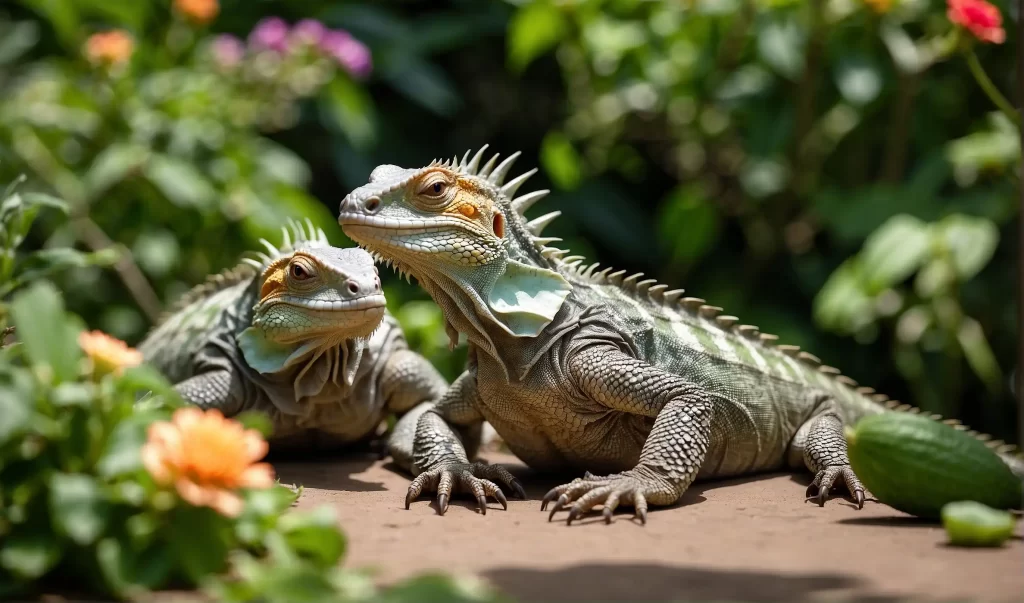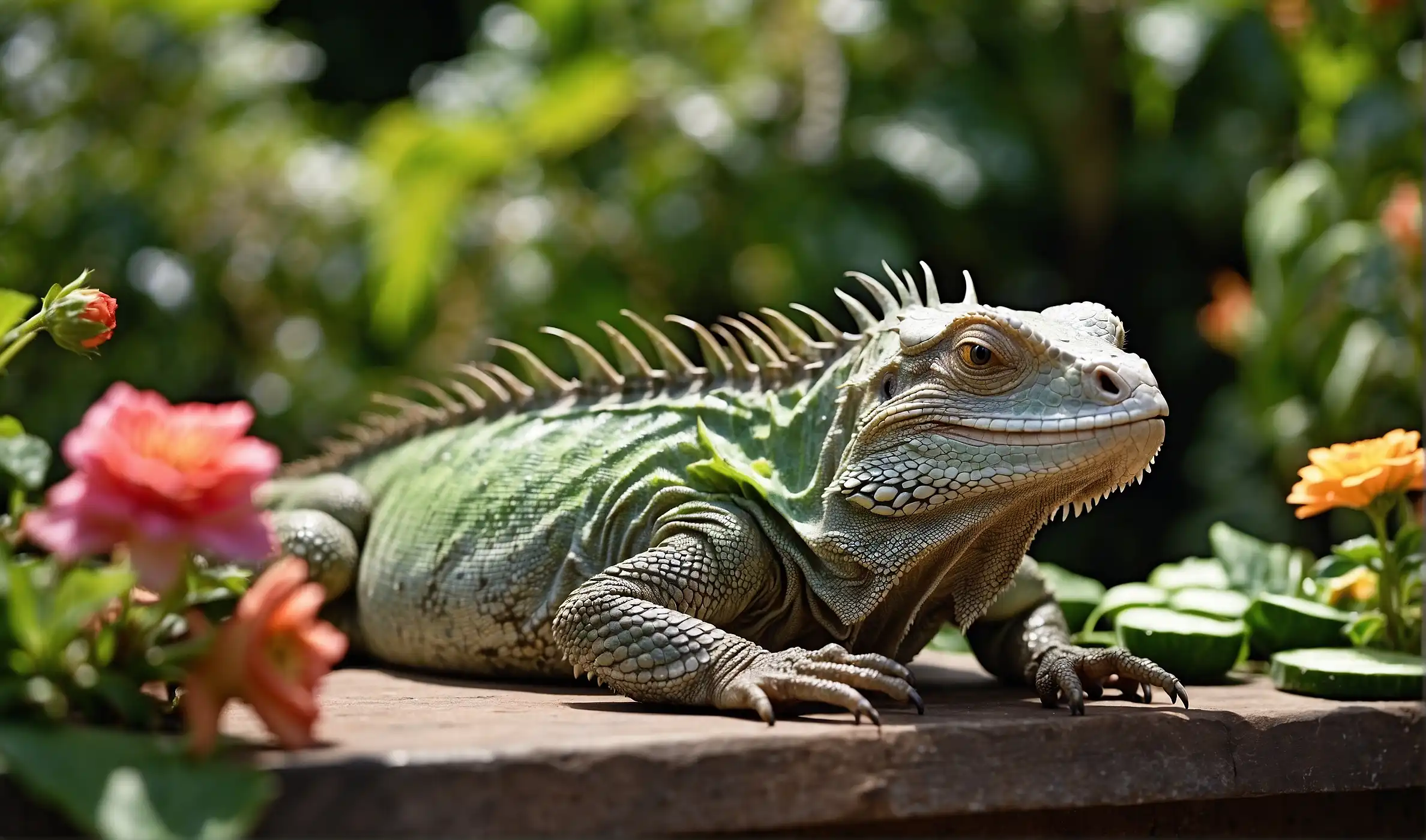Yes, iguanas can eat cucumbers as part of a varied diet. Cucumbers provide hydration and are low in calories.
Iguanas, with their vibrant scales and serene demeanor, are fascinating creatures that are commonly kept as pets. For iguana owners, understanding the dietary needs of these reptiles is crucial to ensure their health and longevity. Cucumbers emerge as an excellent snack due to their high water content and nutritional benefits.
These green vegetables are not only safe for iguanas to consume but also offer a good source of vitamins and minerals, such as vitamin K. They are particularly beneficial during hot weather or in arid enclosures where additional hydration is necessary. It’s important to remember, though, that while cucumbers can be included in their diet, they should not replace nutrient-rich leafy greens that are essential for an iguana’s overall nutrition.
Understanding Iguana Nutrition
Iguanas require a balanced diet rich in vitamins, minerals, and fiber. This diet should primarily consist of leafy greens and vegetables, with a minimal amount of fruits. Providing iguanas with a variety of vegetables is crucial for their health, and cucumbers can be a hydrating choice due to their high water content.
Despite cucumbers being safe for iguanas, they should only be a small part of the iguana’s diet. One common misconception is that iguanas can thrive on fruits and vegetables like cucumbers alone. Yet, over-reliance on any single food item can lead to nutritional deficiencies. It’s important to ensure iguanas receive adequate amounts of calcium and other essential nutrients found in dark, leafy greens, and to limit the amount of fruit and watery vegetables to avoid diarrhea and other digestive issues.
Can Iguanas Safely Consume Cucumbers?
Cucumbers can be a healthy addition to an iguana’s diet, offering hydration and essential nutrients. Replete with vitamins, such as Vitamin K, Vitamin C, and folic acid, cucumbers also contain a suite of minerals including magnesium, potassium, and manganese. The high water content can aid in hydration, making cucumbers an excellent choice for dietary variety.
Iguanas can face risks with certain foods, and moderation is key with cucumbers. These reptiles might suffer from nutritional imbalances if fed cucumbers in excessive amounts due to their lower calcium-to-phosphorus ratio. The potential for diarrhea exists if the water content leads to over-hydration. Therefore, integrating cucumbers as part of a balanced diet is imperative to avoid these risks.

Incorporating Cucumbers Into Iguana Diets
Iguanas can safely enjoy cucumbers as part of a balanced diet. These green veggies provide hydration and are low in calories, making them a healthy snack. Cucumbers should be thoroughly washed to remove any pesticides and cut into appropriate sizes for easy consumption. It’s important to note that while cucumbers are beneficial, they should not be the sole component of an iguana’s diet. Variety is key to meeting nutritional needs.
| Iguana Size | Cucumber Serving Size | Feeding Frequency |
|---|---|---|
| Small/Baby | 1-2 small slices | 2-3 times per week |
| Medium | 3-4 medium slices | 2 times per week |
| Large/Adult | 4-5 large slices | Once per week |
Ensuring a regulated intake is crucial; excess cucumber can lead to nutritional imbalances. Therefore, maintaining the recommended serving sizes and frequency will support your iguana’s health and well-being. Always consult with a veterinarian for a diet tailored to your specific iguana’s needs.
Preparing Cucumbers For Iguana Consumption
Iguanas can safely consume cucumbers, but preparing them properly is crucial to ensure their health and safety. Begin by thoroughly washing the cucumber to remove any pesticides or dirt, which is especially important if you are not using organic produce. It is recommended to use a produce cleaner or a diluted vinegar solution for this purpose.
The next step involves cutting the cucumber into manageable pieces. Slicing the cucumber into thin rounds or long strips makes it easier for iguanas to eat. Whether or not to peel the cucumber is often a question for iguana owners. It’s important to note that cucumber peel is not harmful to iguanas and can provide them with added nutritional benefits. However, some iguanas may prefer peeled cucumbers, while others enjoy them with the skin on.
In summary, introduction of cucumbers into an iguana’s diet should be done with careful preparation, considering the iguana’s preferences and nutritional needs. Always offer cucumbers as part of a varied diet to ensure your iguana receives all the necessary nutrients.
Learn more: Can Sheep Eat Cucumbers
Alternative Hydration Sources For Iguanas
For iguanas, hydration is key to a healthy diet. Most owners understand the importance of water in their pet’s diet, but incorporating water-rich foods like cucumbers can offer additional benefits. Cucumbers, consisting of 95% water, provide a two-fold advantage: they promote hydration and ensure the intake of essential nutrients. Iguanas often find it more appealing to consume water through their diet rather than drinking it directly.
Cucumbers are an excellent complement to an iguana’s hydration strategy because they contain vital minerals and vitamins, which support overall health. Not only is this an efficient way to boost their hydration levels, but it also adds a level of variety to their diet, making mealtime more interesting and enjoyable for the reptile. Care should be taken to balance the diet with other nutritional foods suited for an iguana’s needs to maintain an optimal state of health.
Dietary Risks For Iguanas Eating Cucumbers
Iguanas can indeed eat cucumbers, but it’s crucial to monitor the quantity provided to them. Excessive consumption can lead to nutritional imbalances, as cucumbers are low in essential nutrients and high in water content. A varied diet should include other vegetables and fruits to ensure a well-rounded intake of vitamins and minerals.
Owners should be vigilant for signs of improper nutrition such as lethargy, softening of the bones (metabolic bone disease), and a lack of growth. These are indicative of either a calcium deficiency or an overall poor diet. To avoid these health issues, iguanas should receive a controlled amount of cucumbers as a treat rather than a staple diet component.
Monitoring Iguana Health Post Cucumber Diet
Iguanas can safely consume cucumbers as part of their diet. Observing your iguana post consumption is crucial to ensure they are maintaining good health. Several indicators of good health in iguanas that have been fed cucumbers include vibrant skin color, active behavior, and regular defecation. Their hydration levels should also remain stable since cucumbers contain a high amount of water.
Consistent monitoring of these signs is key. Contrarily, any noticeable changes in behavior or physical condition may necessitate veterinary consultation. Such signs include but are not limited to lethargy, discoloration of the skin, irregular bowel movements, or a lack of appetite. These could be indicators that the cucumber might not be agreeing with your iguana or that there might be an unrelated health issue at play.
Variety In an Iguana’s Diet
Iguanas thrive on a diverse diet rich in vitamins and minerals, facilitating optimal health and vitality. Variety is crucial in preventing nutritional deficiencies and promoting a robust immune system in these reptiles.
Providing a rotation of vegetables and fruits alongside cucumbers can ensure a well-rounded diet. Trusted sources suggest that iguanas enjoy a mix that may include but is not limited to:
- Dark leafy greens like kale, dandelion greens, and mustard greens
- Occasional servings of carrots and squash for beta-carotene
- Fruits such as mangoes, papayas, and figs, ensuring they are offered sparingly due to high sugar content
Ensuring that these offerings are fresh and pesticide-free is of paramount importance.
Creating a Balanced Iguana Meal Plan
Iguanas can enjoy cucumbers as a part of their diet, but it’s essential to combine them with a variety of other foods to ensure they receive all the necessary nutrients. A balanced meal plan includes a mix of leafy greens, calcium-rich vegetables, and limited amounts of fruit to prevent excessive sugar intake.
For juvenile iguanas, high-calcium choices such as collard greens and turnip greens should be offered alongside cucumbers. A simple meal plan might consist of 80% leafy greens, 10% other vegetables like cucumbers, and 10% fruits.
For adult iguanas, the focus is on a variety of greens and vegetables while maintaining a lower proportion of fruits. An example meal for adults might be composed of 50% leafy greens, 30% other vegetables including cucumbers, and 20% fruits. It’s important to sprinkle the meal with a calcium supplement several times a week to support their bone health.
Know more: Can Sugar Gliders Eat Cucumbers
FAQs On Can Iguanas Eat Cucumbers
Can Iguanas Safely Eat Cucumbers?
Cucumbers are safe for iguanas to eat in moderation. They provide hydration and are low in calories, but should not be the main part of their diet due to low nutritional value compared to other vegetables.
How Often Should Iguanas Eat Cucumbers?
Feeding iguanas cucumbers occasionally is best, perhaps once or twice a week. This ensures they get a varied diet rich in essential nutrients from other vegetables and fruits.
Are Cucumbers Nutritious For Iguanas?
Cucumbers contain mostly water and are low in nutrients. They can offer hydration but should be supplemented with nutrient-rich greens like turnip greens and dandelion greens.
Do Iguanas Like Eating Cucumbers?
Many iguanas enjoy eating cucumbers as part of a varied diet. Their freshness and moisture can be appealing, but taste varies from one iguana to another.
Conclusion
Summing up, iguanas can safely enjoy cucumbers as part of their diet. These fresh snacks provide hydration and essential nutrients. Just remember moderation is key, and always consult your vet for personalized dietary advice. Keep your iguana healthy and happy with the right balance of greens!
Discover more about nutritious diets for exotic pets and the latest in sustainable farming at Farm Pioneer, where agriculture meets animal care.
